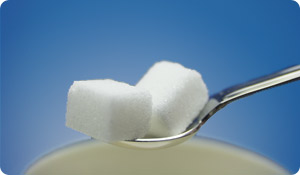
Oligofructose, or OFS, a sugar substitute derived from plants, typically used as a sweetener in high-calorie foods like ice cream, dairy products and baked goods to help people lose weight, may have some other important heart health benefits as well. In a study of 96 adults, ages 32 to 63, all with mild to borderline high blood pressure, participants were given either 20 grams of OFS or a placebo every day for 12 weeks. (Mild or prehypertension is defined as a blood pressure reading of between 120 and 139 (top number) and a diastolic (bottom number) reading of between 80 and 89).
According to study researcher Dan Qu, M.D., Ph.D., of Changhai Hospital in Shanghai, China, the OFS group saw beneficial changes in both their blood pressure readings and cholesterol levels at the end of the study. For example, systolic blood pressure in the OFS participants dropped an average of 6.9 points, compared to 3.5 in the placebo group; and diastolic blood pressure in the OFS group decreased by an average of 7.3 points, compared to 2.3 points in the placebo group. Plus, the OFS participants also had lower levels of total cholesterol (LDL or "bad" cholesterol and triglycerides) than participants taking the placebo.
5 Lifestyle Changes to Reduce High Blood Pressure
But despite these findings, experts say that more studies need to be done before recommendations can be made to people interested in lowering their blood pressure or cholesterol to take OFS supplements. In the meantime, there are many ways you can lower your high blood pressure without taking supplements or drugs. Making some simple changes in your lifestyle can go a long way in reducing your high blood pressure and possibly helping you avoid the need for medication.
-
Lose weight Blood pressure rises as weight increases. Losing just ten pounds can reduce your blood pressure significantly and has the added benefit of making blood pressure medications more effective.
-
Get regular exercise According to the Mayo Clinic, regular physical activity-at least 30 minutes to 60 minutes most days of the week-can reduce your blood pressure by four to nine millimeters of mercury (mm Hg).
-
Eat a healthy diet Eating a diet rich in whole grains, fruits, vegetables and low-fat dairy products, can lower your blood pressure by up to 14 mm Hg.
-
Stop smoking The nicotine in tobacco products can raise your blood pressure by 10 mm Hg or more.
-
Limit alcohol Although small amounts of alcohol can be heart protective, too much can raise blood pressure. Try limiting the amount of drinks you have to one a day for women and two or less a day for men.





